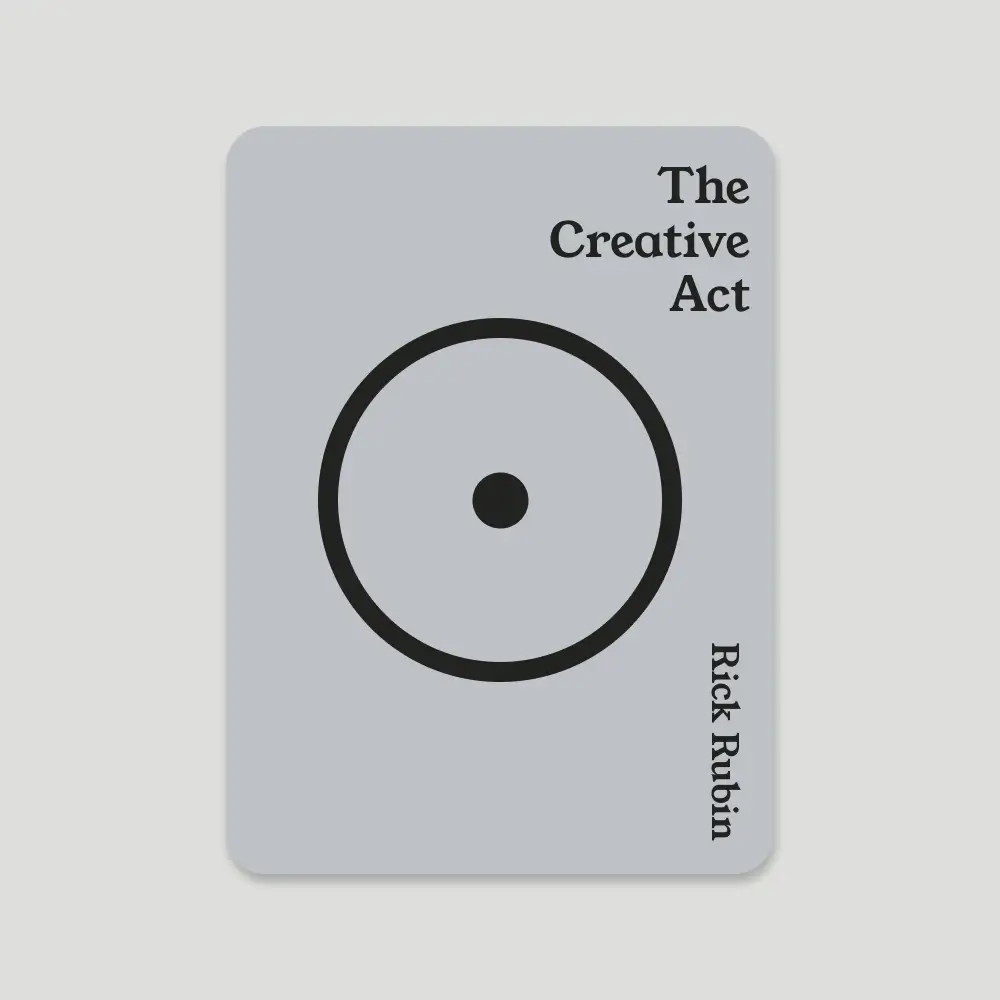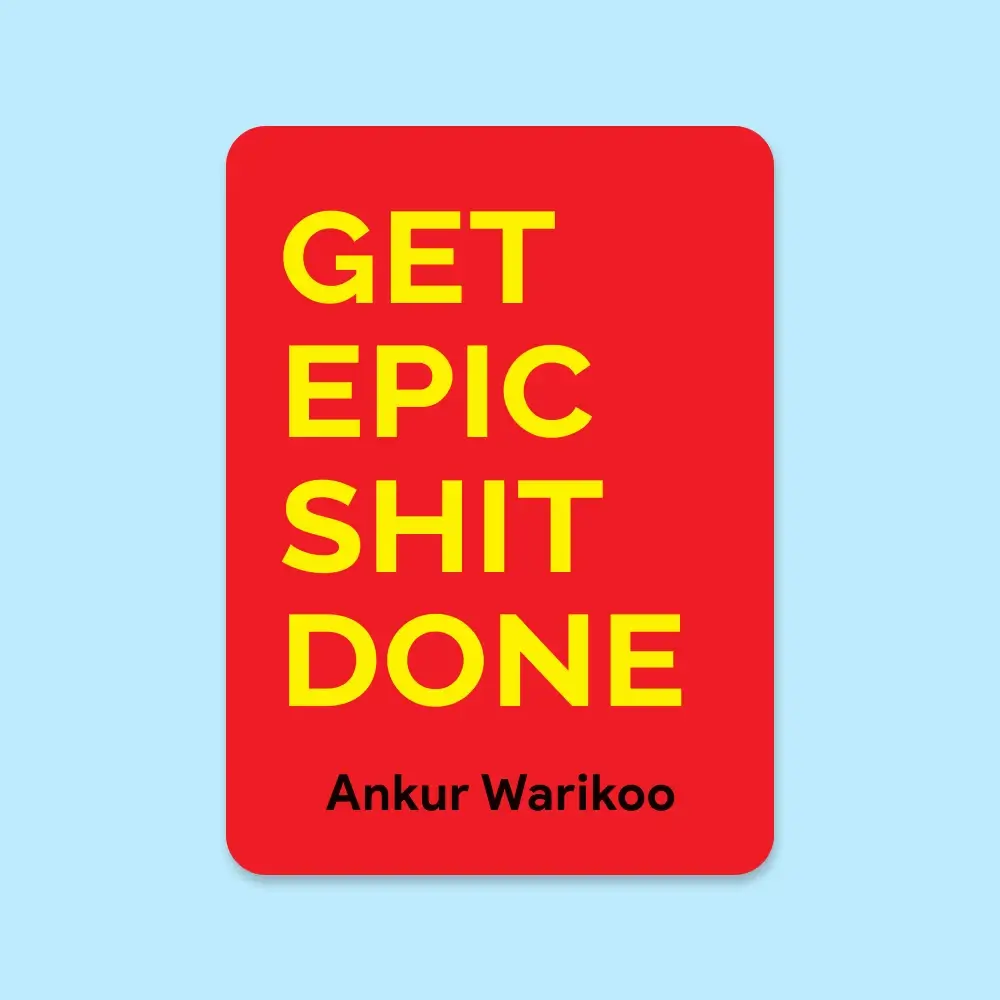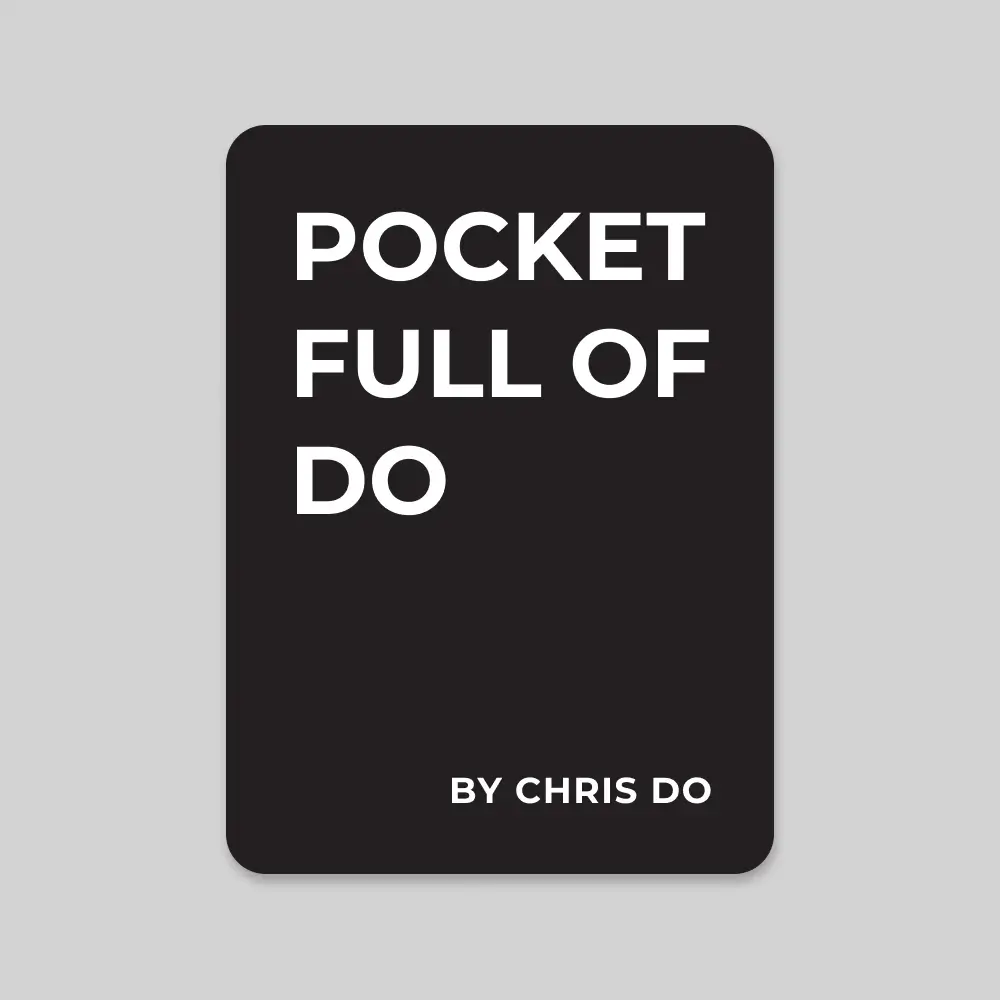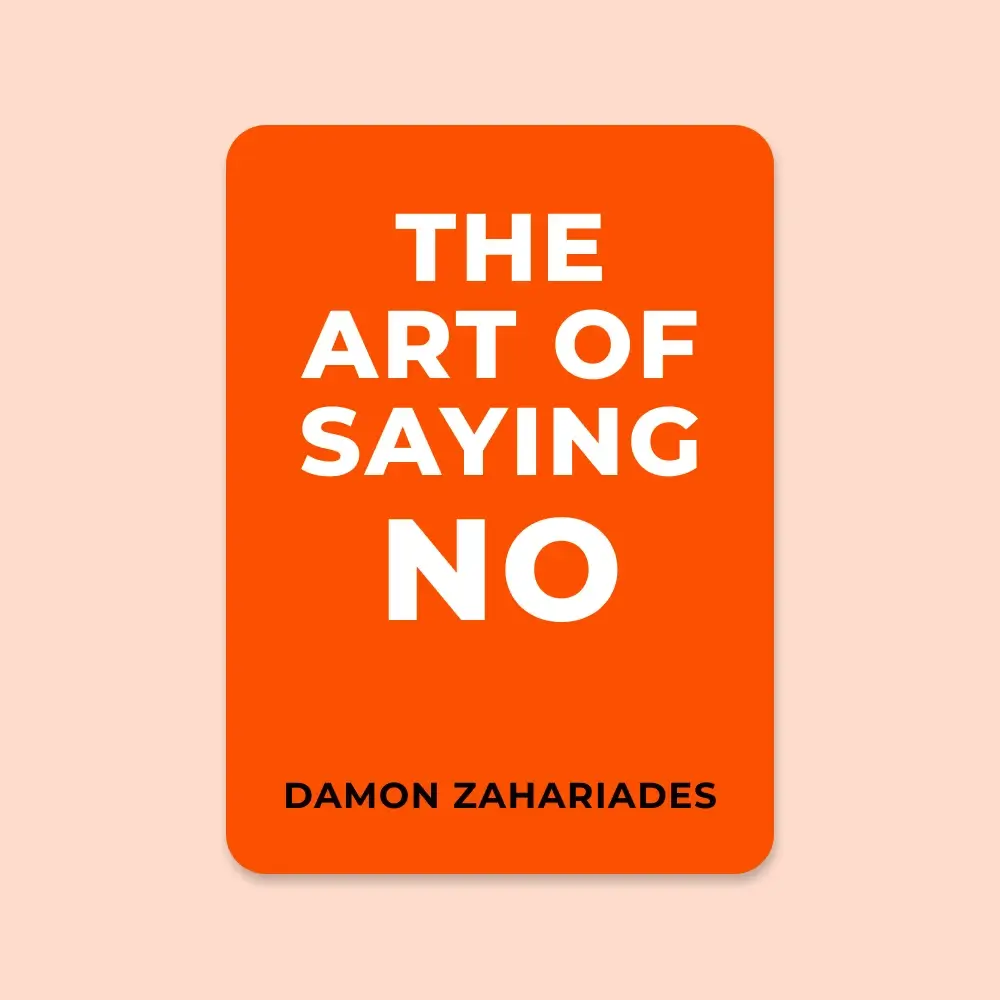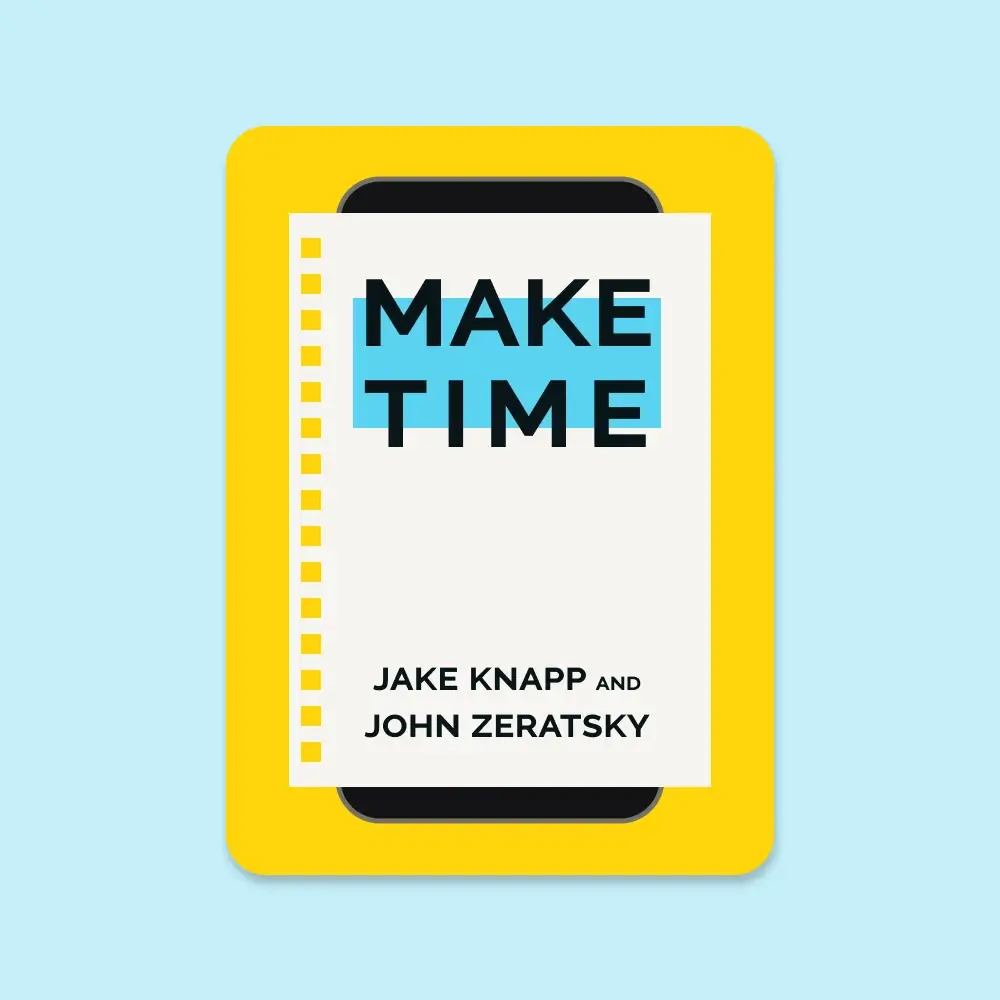
Make Time
-
In the twenty-first century, two very powerful forces compete for every minute of your time. The first is what we call the Busy Bandwagon. The Busy Bandwagon is our culture of constant busyness—the overflowing inboxes, stuffed calendars, and endless to-do lists. The second force competing for your time is what we call the Infinity Pools. Infinity Pools are apps and other sources of endlessly replenishing content. If you can pull to refresh, it’s an Infinity Pool. If it streams, it’s an Infinity Pool.
-
The best tactics are the ones that fit into your day. They’re not something you force yourself to do; they’re just something you do.
We do not remember days, we remember moments. —CESARE PAVESE
-
Doing more doesn’t help you create time for what matters; it just makes you feel even more frazzled and busy. And when you’re busy day after day, time slides by in a blur.
-
Plenty of self-help gurus have offered suggestions for setting goals and plenty of productivity experts have created systems for getting things done, but the space between has been neglected.
-
Three different criteria to choose our Highlight.
-
Urgency - The first strategy is all about urgency: What’s the most pressing thing I have to do today?
-
Satisfaction - The second Highlight strategy is to think about satisfaction: At the end of the day, which Highlight will bring me the most satisfaction?
-
Joy - The third strategy focuses on joy: When I reflect on today, what will bring me the most joy?
-
-
A good rule of thumb is to choose a Highlight that takes sixty to ninety minutes.
-
Choosing a Highlight makes focusing on your priorities the default, so you can spend time and energy on what matters, not on reacting to the distractions and demands of modern life.
-
The things you write down are more likely to happen.
-
Repeat for a second chance. Repeat to build momentum. Repeat to create a habit. Repeat to keep the good times rolling.
-
Bundle up the small tasks and use batch processing to get them all done in one Highlight session. In other words, make a batch of small things your big thing.
-
Checking off finished tasks feels good, but the fleeting glow of accomplishment masks an ugly truth: Most to-dos are just reactions to other people’s priorities, not yours. And no matter how many tasks you finish, you’re never done—more to-dos are always waiting to take their place. To-do lists just perpetuate the feeling of “unfinishedness” that dogs modern life.
-
To-do lists also can obscure what’s really important. We’re all susceptible to choosing the path of least resistance, especially when we’re tired, stressed, overwhelmed, or just plain busy. To-do lists make it worse because they mix easy tasks with hard-but-important ones. When you use a to-do list, you’re tempting yourself to put off those important tasks and knock off one of the easy items instead.
-
A Might-Do List can help you avoid the to-do-list treadmill at the office or on personal projects.
-
Whenever you begin a project, your brain is like a computer starting up, loading relevant information, rules, and processes into your working memory. This “boot up”takes time, and you have to redo it to a certain extent every time you pick up the project. This is why, in our design sprints, teams work on the same project for five days in a row. Information stays in people’s working memory from one day to the next, allowing them to get deeper and deeper into the challenge. As a result, we can accomplish exponentially more than we could if those same hours were spread across weeks and months.
-
When you schedule something, you’re making a commitment to yourself, sending yourself a tiny message that says: “I’m going to do this.”But scheduling your Highlight has another important benefit: It forces you to confront the trade-offs in how you spend your time.
-
A structured day creates freedom.
-
When you don’t have a plan, you have to decide constantly what to do next, and you might get distracted thinking about all the things you should or could do. But a completely planned day provides the freedom to focus on the moment. Instead of thinking about what to do next, you’re free to focus on how to do it. You can be in the flow, trusting the plan set out by your past self.
-
Sometimes we don’t know what we’re capable of until we apply some simple tactics and an experimental mindset to our lives.
-
Working till exhaustion makes us more likely to fall behind by robbing us of the rest we need to prioritize and do our best work. Trying to cram in just one more thing is like driving a car that is running out of gas: No matter how long you keep your foot on the accelerator, if the tank is empty, you aren’t going anywhere. You need to stop and refuel.
To pay attention, this is our endless and proper work. —MARY OLIVER
-
When people are passionate about what they’re doing, they do great work.
-
The best way to defeat distraction is to make it harder to react.
-
When distraction is hard to access, you don’t have to worry about willpower. You can channel your energy into making time instead of wasting it.
-
When your brain changes contexts—say, going from painting a picture to answering a text and then back to painting again—there’s a switching cost. Your brain has to load a different set of rules and information into working memory. This “boot up”costs at least a few minutes, and for complex tasks, it can take even longer.
-
It’s like compound interest. The longer you remain focused on your Highlight, the more engaging you’ll find it and the better work (or play) you’ll do.
Your real life begins after putting your house in order. —MARIE KONDO
Because you’re literally buckled into a chair, I’ve always found planes a terrific spot to do a lot of writing and reading and drawing and thinking. —AUSTIN KLEON
-
Today’s always-on, superfast Internet is a wonderful thing, but it’s also the world’s biggest Infinity Pool. It can be hard to stay in Laser mode when you know the endless possibilities of the Internet are just milliseconds away.
-
Small distractions create much larger holes in our day.
-
When you focus on an app’s purpose, you can change your relationship to it. Instead of reacting to a trigger, prompt, or interruption, you can proactively use your favorite apps—even distracting Infinity Pools—as tools.
-
Instead of checking your email first thing in the morning and then getting sucked in and reacting to other people’s priorities, deal with email at the end of the day. That way, you can use your prime hours for your Highlight and other important work. You’ll probably have a little less energy at the end of the day, but that is actually a good thing when it comes to email: You’ll be less tempted to overcommit by saying yes to every incoming request and less likely to bang out a multipage manifesto when a simple reply would do.
-
Taking control of your inbox requires a mental shift from “as fast as possible” to “as slow as you can get away with.”
-
Headphones and closed doors signal to everyone else that you shouldn’t be interrupted, and they send a signal to you, too. You’re telling yourself, “Everything I need to pay attention to is right here.”You’re telling yourself it’s time for Laser mode.
-
Nothing’s better for focus than a deadline.
-
Shifting your focus to something that your mind perceives as a doable, completable task will create a real increase in positive energy, direction, and motivation.
-
It’s easier to get into Laser mode when you adopt simple tools that are readily available. That way, when something breaks, or your battery dies, or you forget your gadget at home, you won’t miss a beat.
-
Paper improves focus, because you can’t waste time picking the perfect font or searching the Web instead of working on your Highlight. Paper is less intimidating, too—while most software is designed to guide you through a series of steps that will lead to a finished product, paper allows you to find your own way to a cohesive idea. And paper opens up possibilities, because whereas Word is designed for lines of text and PowerPoint is designed for graphs and bullet points, on paper, you can do anything at all.
-
One breath really can be enough to reset your attention. Paying attention to your body shuts up the noise in your brain. And even a pause that lasts only one breath can bring your attention back to where you want it—on your Highlight.
-
When you’re deprived of distraction, you may feel bored—but boredom is actually a good thing. Boredom gives your mind a chance to wander, and wandering often leads you to interesting places.
-
Being stuck is a tiny bit different from being bored. When you’re bored, you don’t have anything to do, but when you’re stuck, you know exactly what you want to do—your brain just isn’t sure how to proceed. Maybe you don’t know what to write next, or where to begin on a new project. Don’t give up. Stare at the blank screen, or switch to paper, or walk around, but keep your focus on the project at hand. Even when your conscious mind feels frustrated, some quiet part of your brain is processing and making progress. Eventually, you will get unstuck, and then you’ll be glad you didn’t give up.
-
The defaults of today’s world assume that the brain is the one driving the bus, but that’s not really how it works. When you don’t take care of your body, your brain can’t do its job.
-
If you want energy for your brain, you need to take care of your body.
-
Our bodies and brains perform best when we’re in motion. To charge your battery, you don’t have to train for a marathon or attend predawn boot camp. Just a twenty- to thirty-minute session can make the brain work better, reduce stress, improve your mood, and make it easier to sleep well, providing more energy for the next day—a pretty sweet positive feedback loop.
What you do every day matters more than what you do once in a while. —GRETCHEN RUBIN
-
Walking is practically a wonder drug.
-
Your feet were made for walking—and that’s just what they should do.
-
In high-intensity interval training—or, as we call it, a “super short workout”—you complete a series of brief but intense moves. You can choose body weight exercises such as push-ups, pull-ups, and squats. You can sprint. You can lift weights. And you can finish a proper workout in as little as five or ten minutes.
-
The best part is that super short workouts are truly energizing. And it’s not just a time-saving substitute for “real”exercise. In fact, there’s evidence that high-intensity exercise is better overall than the longer medium-intensity workouts we all think are necessary.
-
Eat food. Not too much. Mostly plants.
-
One simple technique to keep meals light and energizing is to put salad on your plate first, then add everything else around it. More salad means less heavy food and, most likely, greater energy after eating.
-
If you wait until you get tired, it’s too late.
-
Studies have shown that caffeine naps improve cognitive and memory performance more than coffee or a nap alone does.
-
What most people don’t realize is that the half-life of caffeine is five to six hours. So if the average person has a coffee at 4 p.m., half the caffeine is out of the bloodstream by 9 or 10 p.m., but the other half is still around.
-
When walking through nature, you’re freed from having to direct your attention, as there are few challenges to navigate (like crowded street crossings), and experience enough interesting stimuli to keep your mind sufficiently occupied to avoid the need to actively aim your attention. This state allows your directed attention resources time to replenish.
-
Meditation is just a breather for your brain. Meditation is also exercise for your brain.
-
It’s a cruel irony of modern life that we’re surrounded by people yet more isolated than ever.
-
Spending time with interesting, high-energy people is one of the best—and most enjoyable—ways to recharge your battery.
Science and everyday life cannot and should not be separated. —ROSALIND FRANKLIN
-
Remember that perfection is not the goal.
-
Small Shifts Create Big Results.
Do not ask yourself what the world needs. Ask yourself what makes you come alive, and then go do that. Because what the world needs is people who have come alive. —HOWARD THURMAN
